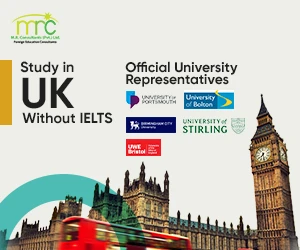
Many students believe that studying abroad offers access to high-quality education and academic resources that may not be available in their home country. Renowned universities and institutions abroad often have advanced facilities, experienced faculty, and cutting-edge research opportunities. No doubt it also provides an opportunity for Pakistani students to broaden their horizons and gain exposure to different cultures, perspectives, and ideas. It allows them to develop a global mindset and enhances their cross-cultural understanding and communication skills.
Consider Study Cost While Applying For Study Abroad
When applying to study abroad, there are several important factors to consider including cost and finance assessment. Studying abroad can be expensive, especially in countries where tuition fees and living expenses are significantly higher than in Pakistan. Not all students have access to sufficient personal or family funds to finance their education abroad. Taking out a loan can help cover the substantial costs associated with international education.
Organizations In Pakistan Offer Study Loan To Pakistani Students
There are several organizations in Pakistan that offer study loans to students who wish to pursue higher education abroad. Some of the prominent study loan organizations in Pakistan include:
-
National Bank of Pakistan (NBP)
-
Habib Bank Limited (HBL)
-
United Bank Limited (UBL)
-
Bank Alfalah
-
Meezan Bank
-
Askari Bank
-
Bank of Punjab
-
Bank Islamic Pakistan Limited
-
Punjab Education Endowment Fund (PEEF)
-
The Citizens Foundation (TCF)
Factors To Consider When Applying For Study Loan
When applying for an education loan to study abroad, there are several important factors to consider. Here are four things to keep in mind:
-
Research Loan Options and Lenders
-
Take the time to research different loan options and lenders to find the best fit for your needs. Look for reputable lenders that offer competitive interest rates, flexible repayment terms, and favorable loan conditions. Compare loan products, terms, and eligibility requirements to make an informed decision.
-
-
Determine the Loan Amount Needed
-
Calculate the total cost of your education, including tuition fees, study visa cost for different countries, living expenses, travel costs, and other related expenses. It's crucial to have a clear understanding of the amount of money you need to borrow to cover these expenses. Be realistic about your financial needs and borrow only what is necessary to avoid excessive debt.
-
-
Understand Interest Rates and Repayment Terms
-
Pay close attention to the interest rates offered by lenders and understand the repayment terms. Interest rates can significantly impact the total cost of your loan, so try to secure a loan with a favorable interest rate. Additionally, carefully review the repayment terms, including the duration of the loan, grace period, and any repayment flexibility or options available to you.
-
-
Check Eligibility Criteria and Application Requirements
-
Familiarize yourself with the eligibility criteria and application requirements of the education loan. Understand the lender's requirements regarding credit history, cosigner obligations, collateral, and any additional documentation needed. Ensure that you meet the eligibility criteria before applying to avoid unnecessary rejections or delays.
-
Explore Available Study Abroad Scholarships |
Frequently Asked Questions
1 - How does a study abroad loan work?
Study abroad loans typically involve borrowing a specific amount of money from a lending institution or a financial organization. The borrower is then required to repay the loan, usually with interest, over a specified period of time, according to the terms and conditions of the loan agreement.
2 - What expenses can a study abroad loan cover?
Study abroad loans can typically cover a range of expenses, including tuition fees, accommodation, living expenses, textbooks and supplies, travel costs, health insurance, and other related educational expenses.
3 - Do study abroad loans require collateral or a cosigner?
Collateral or a cosigner may be required by some lenders to secure the study abroad loan, especially if the borrower has limited credit history or income.
4 - What are the interest rates and repayment terms for study abroad loans?
Interest rates and repayment terms vary depending on the lender, loan amount, and the borrower's creditworthiness. It is important to carefully review and compare interest rates, repayment periods, grace periods, and any other terms and conditions before selecting a study abroad loan.
5 -Can study abroad loans be used for any country or university?
Study abroad loans can typically be used for educational institutions around the world, although specific restrictions may apply depending on the lender.



.gif)


 997
997
 0
0


























